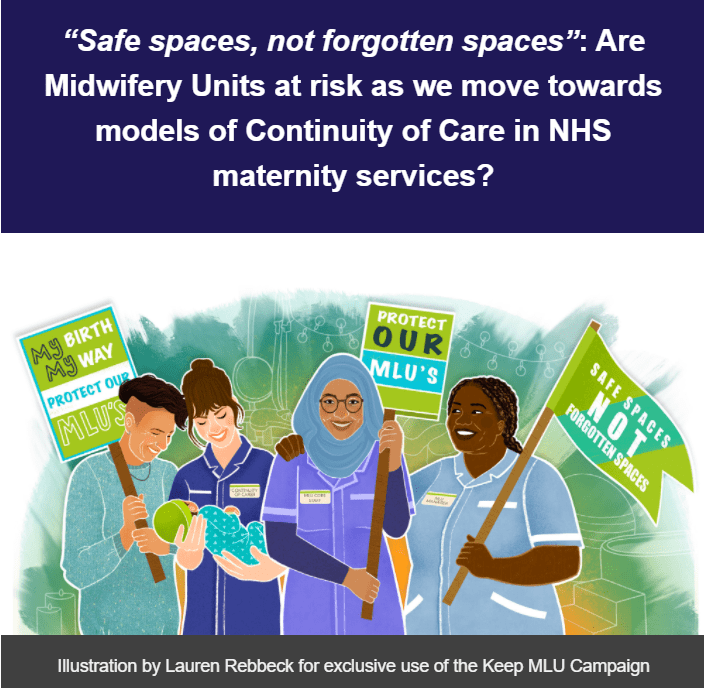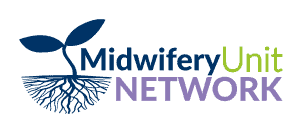

Welcome to our April newsletter!
At MUnet, we will always champion those organisations that deliver effective, safe and respectful midwife-led care in-line with current evidence. Conversely, it is also important we cast a spotlight on any emerging issues of concern within this arena. This month, we are pleased to showcase the campaigning work of two dedicated and courageous midwives, Katherine Letley and Lottie Blunden.
We hope you find this article thought-provoking and invite you to join a thread on our Facebook page to share your views around this subject.
With thanks, The MUNet Director Team (Lucia, Chantelle, Ellen and Richard).
Where Midwifery Units (MUs or birth centres) work, they work very well. Outcomes for women and babies are better; rates of normal birth are higher and birth experiences more positive. One of the key findings of the Better Births report (2016) was that 55% of women wanted to birth in an MU, and that more women and pregnant people could be using an MU than actually do. Facilitating women to birth in their chosen environment therefore means increasing the use of MUs. So – good news for all of us who support an MU philosophy?
As we move into continuity models across the service, Better Births recommends that core staff are required and maintained on the obstetric unit and in triage areas. However, there appears to be no recommendation about the protection of core staffing on MUs. In some areas of the country, it appears MU core staff have been redeployed to other maternity areas and the role of MU ‘manager’ or ‘leader’ is under serious threat. The reality of having skeleton staff or even an unstaffed birth centre has begun to raise questions about safety and how the philosophy of this birth environment will be nurtured and protected.
As authors of this article, up until recently, we were both core MU midwives working in an alongside-MU at a rural teaching hospital. We have direct experience of the changes described as they occurred within our unit. This experience prompted us to write a published MIDIRS article highlighting these issues, in the hope of opening up a national conversation about the future of MUs. We had an overwhelmingly positive response following the article, subsequently hosting a meeting with over 40 midwives from across the nation who all held similar concerns. Some insights were quite emotional, with MUs being described as ‘just some rooms with nice pictures on the walls’, or even being refashioned as ‘Covid wards.’ Attendees reported some birth centres appear to be losing their well-established philosophy and sense of ownership, with leaders being moved into other clinical roles.
Compounding this, in many trusts, student midwives may not have the opportunity for core placements on MUs, thus the midwifery education system does not appear to be building midwives who are confident in delivering physiological birthing care. As the induction, intervention and C section rates continue to rise, many midwives are being conditioned into ‘high risk‘ birthing care as the default. We recognise that not all midwives choose or are skilled to work in physiological birth settings. With the dominance of the medical-industrial model of care, many midwives may feel holistically ‘safer’ working on the delivery suite alongside continuous fetal monitoring and an obstetric-led plan of care. To assume that these midwives will then feel holistically safe in an MU environment is perhaps an oversight.
An MU without a leader or core staff lacks identity as a safe and designated birthing space (Rocca-Ihenacho et al. 2020). A common theme from safety reports investigating poor outcomes is absent or poor leadership (Royal College of Midwives, 2020). It is known that some birth centres fail because of a lack of robust management and political championing. So why would we want to risk all that we have gained by not addressing the core staffing and leadership of MUs consistently across the nation?
It strikes us that it has taken many decades of work by influential birth workers, academics, campaigners and researchers to secure and establish safe and well-led MUs within the heart of the maternity system. To deny MUs of core staff is to deny them of true value, meaning and integrity. In the current political climate of senior politicians calling down ‘normal’ births and labelling midwives as ‘cultists’ (Ellen 2020) – we need to act to change the direction of the conversation before MUs lose their primary purpose. All midwives with passion and skill can deliver safe and effective midwife-led care, and midwives carry these skills within them – utilising them (as best they can) in any birthing environment. But midwives need support and appropriate team spirit; they need their team and their work-space needs maintaining, leading and nurturing.
We are working collaboratively with Midwifery Unit Network to highlight these issues. We want to know how we can ensure MUs are kept safe and ensure that they have core staff and appropriate leadership, as this is not happening at some units across the nation.
If you work in an MU in the UK we would love to hear from you. We want to raise the voices of midwives whose MUs are experiencing a lack of ownership, and to hear from units where things are going well since the introduction of continuity models.
We want to find out what we can do to make these safe, not forgotten spaces.
See our website
To add your comments about this issue, please visit our thread on the MUNet Facebook page or send a direct email to info@munetwork.org
References:
Ellen, B. The natural birth cultists care little about leaving women in agony. The Guardian. https://www.theguardian.com/commentisfree/2020/dec/12/natural-birth-cultists-care-little-that-women-are-left-in-agony. Published 12th December 2020.
Letley K., Blunden, L. MIDIRS Midwifery Digest, vol 31, no 1, March 2021, pp 108-110.
NHS England. Better Births. https://www.england.nhs.uk/wp-content/uploads/2016/02/national-maternity-review-report.pdf. Published 2016. Accessed 4th November 2020.
Rocca‐Ihenacho L., Yuill C., McCourt C. (2020) Relationships and trust: Two key pillars of a well‐functioning freestanding midwifery unit. Birth. 2020 Dec 11.
Royal College of Midwives. Reviewing Maternity Services. https://www.rcm.org.uk/promoting/learning-careers/leadership/. Published 2020. Accessed 9th November 2020.

